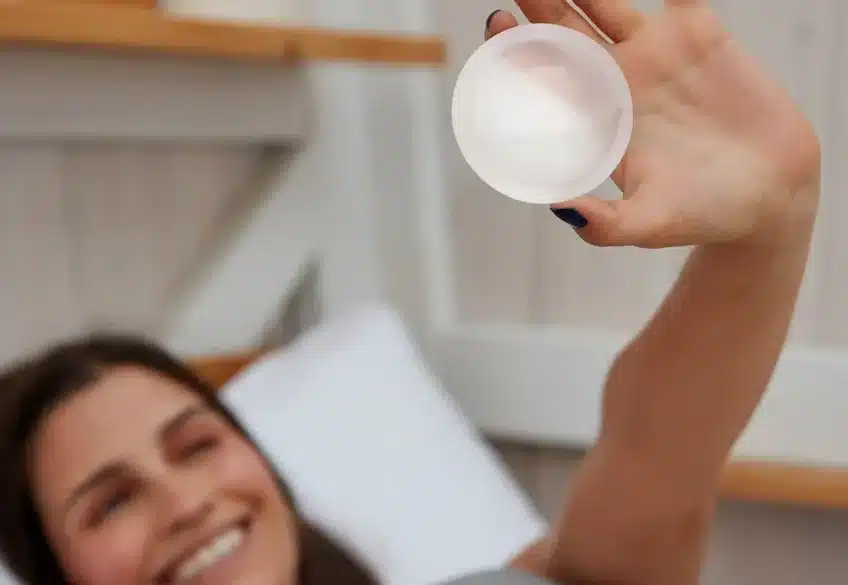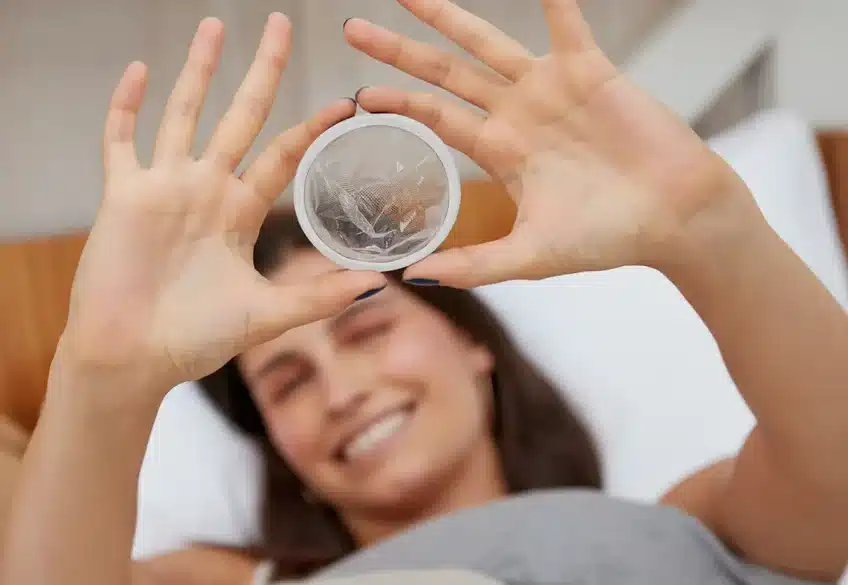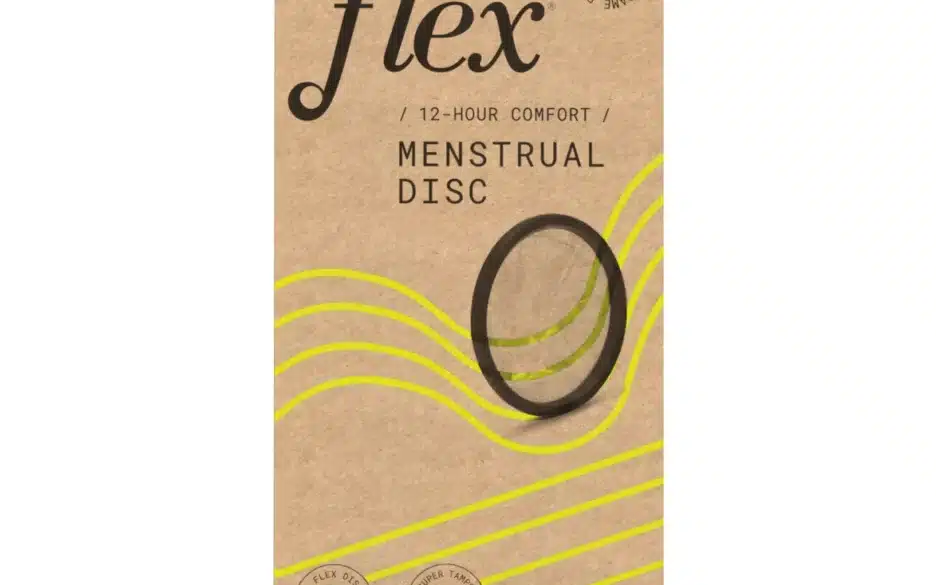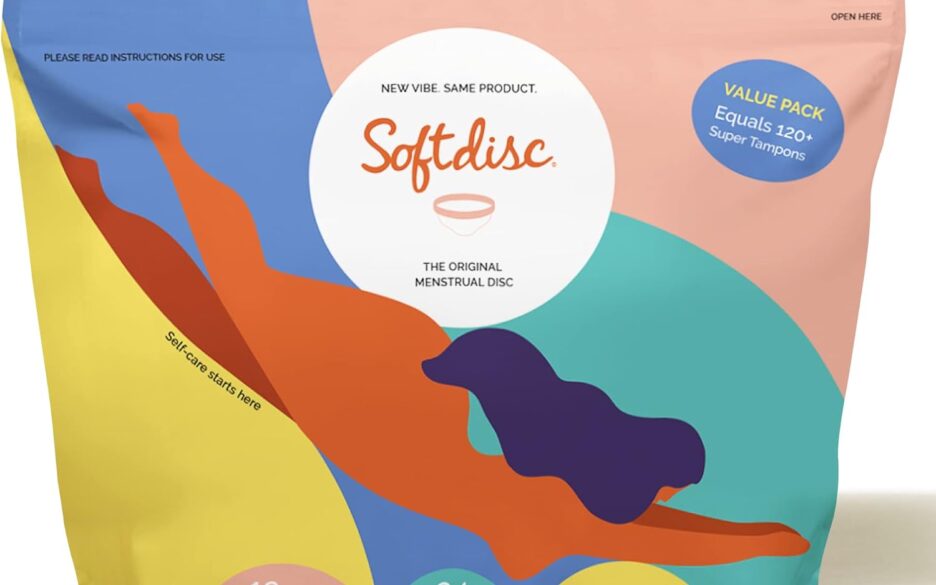We put SoftDisc® – the original disposable menstrual disc – head to head with Flex. Find out which one wins for most sustainable menstrual disc.
Table of Contents
Once upon a time, reusable pads and menstrual cups were the only sustainable options for period management. Then came SoftDisc, formerly known as Instead. These single-use plastic menstrual discs look and feel different to menstrual cups like the Diva Cup, offer longer lasting protection with nearly twice as much capacity, and provide greater comfort for many menstruators. The trouble is, those discs are disposable after just one use.
Step up Flex.
Flex has been providing its own single-use menstrual discs for decades. More recently, it launched a reusable menstrual disc and (somewhat) plant-based disposable menstrual discs too. The Flex company also bought out SoftDisc when its parent company planned to stop making the single-use discs.
Given that they’re now all made by the same company, what’s the difference between SoftDisc, Flex Discs, Flex Plant+ Discs, and Flex Reusable Discs?
We break down the details below and declare a winner for the best reusable menstrual management product.
| SoftDisc | Flex Disc | Flex Plant+ Disc | Reusable Flex Disc | |
|---|---|---|---|---|
| Materials | Medical-grade polymers (undisclosed otherwise) | Medical-grade polymers, mineral oil, antioxidants | Medical-grade polymers, plant-derived medical-grade polymers, mineral oil, antioxidants | Medical grade silicone |
| Does not contain | BPA, phthalates, colorants, or natural rubber latex | BPA, phthalates, colorants, or natural rubber latex | BPA, phthalates, colorants, or natural rubber latex | BPA, phthalates, colorants, or natural rubber latex |
| Longevity | Single use | Single use | Single use | 2 years |
| Holds equivalent of | 5 tampons | 5 tampons | 5 tampons | 6 tampons |
| Disposal | Landfill | Landfill | Landfill | Landfill (possibly recycling if facilities available) |
| Packaging | Plastic and cardboard | 100% recyclable | Compostable | 100% recyclable |
| Cost | $15.49 for 12 / $26.99 for 24 | $16.49 for 12 discs | $16.49 for 12 discs | $34.99 (comes with two disposable Flex Discs and carry pouch) |
| View price on | Amazon / Walmart | Amazon / Walmart | Amazon / Walmart | Amazon / Walmart |
Our top pick
All SoftDiscs and single-use Flex Discs are disposable, which means they’re not entirely environmentally friendly. We still like them though because they can have a slightly lower environmental impact than conventional plastic-wrapped disposable tampons, especially those with plastic applicators. The best of the disposable bunch is the Flex Disc Plant+.
The top choice overall, though, is the Reusable Flex Disc.
- Reusable and can last two or more years
- Holds equivalent of up to 6 super plus tampons
- Comfortable and easy to use – can even reduce cramps!
- Great for heavier bleeding
- Suitable for use when swimming, exercising, and overnight
- Doesn’t need taking out for penetrative sex
- Saves $$$s compared to single-use discs or tampons
- Medical grade silicone with no added colorants or chemicals
- Does not promote toxic bacterial growth or disrupt vaginal pH
- Helps control period odor
- Silicone is hard to recycle
- Can discolor quickly
- Steep learning curve for use
- May feel too messy for some users
- Packaging isn’t compostable
At a glance:
Materials: Medical grade silicone
Price: $34.99
Holds equivalent of: 6 tampons
Longevity: 2 yrs+
Made in: USA or Canada
Flex designed its reusable menstrual disc to mirror its disposable disc design, meaning it is just as comfortable and easy to use. In fact, the reusable disc may even help reduce period cramps and discomfort! (This has also been my experience with the Diva Cup.)
Each Reusable Flex Disc has a capacity of 70mL of period blood (more than 14 teaspoons). This is the equivalent of more than 6 super tampons and two to three times as much as a typical menstrual cup. Given this disc could last you two years (maybe more with proper care and cleaning), a single reusable disc could replace hundreds of tampons.
One reusable disc can be worn for up to 12 hours. You can also have fun learning to empty the disc hands-free while using the bathroom! This is great for when using public bathrooms where emptying, cleaning, and reinserting a menstrual cup is a bit arduous.
The reusable disc typically comes with two disposable discs too, plus a carrying bag for the reusable disc.
- Made of 40% bioplastic
- Compostable packaging
- Safe, medical grade plastic polymers
- Warms up with body heat to create a leakproof seal
- Single-use plastic
- Can’t be recycled
- Slightly less capacity than reusable disc
At a glance:
Materials: Medical-grade polymers, plant-derived medical-grade polymers, mineral oil, antioxidants
Price: $16.49 for 12 discs
Holds equivalent of: 5 tampons
Longevity: Single-use
Made in: USA or Canada
Flex Disc launched its Plant+ Discs as part of its overall sustainability strategy. These discs are made with 40% bioplastic from sugarcane, which helps to cut carbon emissions associated with the discs and means there is less petroleum-based plastic going into landfill.
According to Flex, Plant+ Discs produce 71% less waste than traditional period products. (The standard Flex Discs reduce 60% of waste.) The bio-based polymer also captures CO2 during production, rather than emitting CO2; Flex estimates an overall reduction of 176% kg of CO2 emissions compared to a non-plant-based polymer.
There’s no tangible difference between the partially bio-based discs and the original Flex discs. They perform equally as well and are the same shape, size, and price.
Given the above, I’d love to see Flex stop making the fully petroleum-based plastic discs. Chances are, the company profits more from the cheap fossil fuel plastic versus the bio-based plastic.
Oddly, the Flex Company packages its Plant+ Discs in compostable packaging, while continuing to use different packaging for its standard discs. Surely the more sustainable choice would be to use compostable packaging across the board, Flex?
Note: While the Plant+ Discs are more eco-friendly, they are not biodegradable or compostable. Do not flush or recycle Flex Plant+ Disc.
- Made of medical grade, safe, non-toxic plastic polymers
- Warms up with body heat to create a leakproof seal
- Biodegradable, recyclable packaging
- Made without BPA, phthalates, or latex
- Can be used for up to 12 hours
- Excellent for people with heavy flow, exercise, swimming, and penetrative period sex
- Recyclable packaging
- Made of plastic
- Single-use
- Can’t be recycled (aside from packaging)
- Slightly less capacity than reusable disc
At a glance:
Materials: Medical-grade polymers, mineral oil, antioxidants
Price: $16.49 for 12 discs
Holds equivalent of: 5 tampons
Longevity: Single-use
Made in: USA or Canada
The Flex Company makes its original FLEX discs using medical grade plastic polymers similar to those used in baby bottle nipples and surgical tools. This material is hypoallergenic and made without natural rubber latex or silicone.
The Flex Company estimates that Flex Discs generate 60% less waste than traditional period products. The Plant+ Discs are 71% less wasteful.
I strongly recommend choosing the more sustainable Flex Plant+ Discs over the original, given that the two perform equally well, cost the same, but have a different ecological footprint.
- Made of medical grade plastic polymers
- Available in a value size
- Slightly cheaper than Flex Discs
- Made without BPA, phthalates, or latex
- Can be used for up to 12 hours
- Excellent for people with heavy flow
- Can wear during exercise, swimming, and penetrative sex
- Made of plastic
- Single-use
- Can’t be recycled
- Slightly less capacity than reusable disc
- Company doesn’t fully disclose materials or packaging materials
At a glance:
Materials: Medical-grade polymers (not fully disclosed)
Price: $15.49 for 12 discs / $26.99 for 24 discs
Holds equivalent of: 5 tampons
Longevity: Single-use
Made in: Not disclosed
SoftDiscs are a little less intimidating than a silicone menstrual cup, and arguably more convenient and eco-friendly that some disposable tampons. This is because a single SoftDisc can provide up to 12 hours of protection, reducing overall waste.
It’s other key advantage is that it sits higher in the vagina than a menstrual cup or tampon, meaning that it doesn’t need removing before penetrative sex.
Because the discs are disposable and can’t be recycled (because they’re medical waste, technically), they’re not as eco-friendly as reusable period products made with organic cotton or silicone. Even organic cotton tampons that are wrapped plastic-free are more sustainable overall.
However, compared to conventional disposable tampons and pads, SoftDiscs are the more eco-friendly and safer choice. You use fewer of them and they don’t pose a risk of TSS.
The best option, though, is a reusable Flex Disc, with the Plant+ Discs the runner-up.
Yes!
When the CARES Act passed in March 2020, menstrual care products began qualifying as medical expenses for HSA and FSA accounts.
As such, menstrual cups and discs, including Flex products, are eligible for HSA and FSA reimbursement. If you need a receipt for reimbursement, Flex is happy to provide one.
Menstrual discs have the advantage of sitting higher in the vaginal canal than menstrual cups. They are held in place behind the pubic bone, rather than by the pelvic floor muscles. This makes them useful for folks with pelvic floor problems. They can also feel more comfortable than a cup, with no protruding stem, meaning that many users noting that they forget the disc is even there.
Because the disc sits higher than a cup, it can stay in place during penetrative sex and is a little less likely to leak than cups. That’s only if you insert it correctly, though.
If you’re used to a menstrual cup, a menstrual disc can feel a little strange to insert and remove. The menstrual disc is circular rather than bell shaped and sits higher in the vagina than a cup, at an angle, so it stays in place behind the pubic bone. Inserting it lower in the vagina, where a menstrual cup or tampon would sit, means that the disc won’t work properly and will leak.
Because there’s no applicator system or stem to grab hold of with a menstrual disc, you have to be comfortable retrieving the disc from this higher position. Some people find it best to do this while in the shower.
Disposable menstrual discs are a good option for cup users concerned about hygiene while traveling. Alternatively, more eco-friendly tampons not wrapped in plastic offer a more sustainable, non-toxic choice.
Menstrual discs are excellent for people with heavy flow due to conditions such endometriosis, PCOS, etc. They can also help reduce the risk of Toxic Shock Syndrome (TSS) as they don’t encourage bacterial growth.
Because discs collect rather than absorb fluid, they help to minimize odor, leaks, irritation and dryness.



